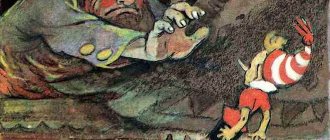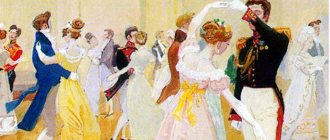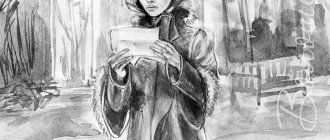- Summary
- Tolstoy Lev
- Kreutzer Sonata
The story begins with a conversation going on in a train carriage about love, women and marriage. Everyone involved in the debate has their own opinion and one lady says that love gives meaning to marriage. Suddenly, the elderly man laughs behind her through sobs, causing everyone to pay attention to him. Previously, a man who had been sitting silently and not interfering in the conversation suddenly intervenes in it. He begins to ask those present what is their understanding of love? How long does it last? What happens? Then he introduces himself and says that he is the same Pozdnyshev who killed his wife. The conversation dies down and no one says anything else.
Late at night, Pozdnyshev finally tells his whole story to one of his fellow travelers. Before the wedding, the man lived like everyone else: he led a rather wild lifestyle, went to taverns, had insignificant affairs with women, smoked, drank and did everything that many others did at his age. But like many, I dreamed of love and wanted to marry the right girl. I looked closely at all the women around me and, of course, found the one I wanted to marry.
After one of the dates, in a fit of romantic feelings and mood, Pozdnyshev decided that she was the one. She was pretty, beautifully and tastefully dressed in clothes that suited her very well, and that was what he remembered most clearly from that evening. The very next day he proposed to the girl. After the wedding, everything very quickly became somehow wrong. The spouses became bored, sad, they did not understand each other. Pozdnyshev was more and more surprised. How so? Isn't marriage about love? Isn't it something sublime? Why then does it turn out this way? They gradually had children, the wife loved them very much and was busy with them almost all the time; there was practically no other conversation between them except about their children. They blamed each other for their problems and fought a lot. When they came to the conclusion that they no longer needed to have children, the wife, who had previously been immersed in everyday problems, suddenly realized that there was a world around too. A world she had barely seen. Having gotten married early, having heard plenty of other people's advice about big and great love, in which there is the meaning of a woman's life, she ultimately saw nothing. She wanted something new and began to play the piano again.
Soon a new person appeared in their lives. The violinist and musician Trukhachevsky, with Pozdnyshev’s wife, they very quickly found a common language and began to perform music together. And although Pozdnyshev was tormented by jealousy, it still seemed to him that this musician somehow looked at his wife differently, he continued to smile in Trukhachevsky’s face and, without showing it, shook his hand. At a dinner party, his wife and a musician performed Beethoven's Kreutzer Sonata, and this changed something in the man's soul. The dinner ended well, everyone left safely.
A few days later, Pozdnyshev went to the district, he was in a good mood, but one day he was overcome by the thought that his wife might be cheating on him with Trukhachev, she did not leave him. He continued to think and think about it, and in the end, unable to bear it, he packed up and went back. Pozdnyshev continued to think about this while he was driving, many thoughts rushed through his head.
Returning home, he learned from the footman that they were both there and, burning with jealousy, rushed at Trukhachev with a dagger, his wife tried to stop him and he stabbed her. When Pozdnyshev came to his senses, it was too late. He spent almost a year waiting for his verdict; at the trial he was acquitted, and his sister-in-law took the children. In a marriage in which there is no understanding between people, but only passion, it will very quickly be replaced by hatred and in the end everything will turn into failure, because this is not enough to build a family.
You can use this text for a reader's diary
Tolstoy Lev. All works
- Shark
- Alyosha Pot
- Albert
- Anna Karenina
- The Battle of Austerlitz in the novel War and Peace
- Poor people
- Mad Dog
- The Battle of Borodino in the novel War and Peace
- Bulka
- Power of darkness
- War and Peace by volume
- Resurrection
- Chapter Natalya Savishna from the story Childhood
- Two brothers
- Two hussars
- Two comrades
- Childhood
- Devil
- Living Dead
- The Rostovs' name day in the novel War and Peace
- Confession
- Prisoner of the Caucasus
- Cossacks
- How geese saved Rome
- How a man divided geese
- Bone
- Kitty
- Kreutzer Sonata
- Swans
- Lion and dog
- Lipunyushka
- Lucerne
- Raid
- walnut branch
- Father Sergius
- Boyhood
- Petya Rostov
- The fruits of enlightenment
- Fire
- After the ball
- Righteous Judge
- Bounce
- Sevastopol in December
- Sevastopol stories
- Family happiness
- Death of Ivan Ilyich
- Old grandfather and grandson
- Three Bears
- Three deaths
- Morning of the landowner
- Filipok
- Hadji Murad
- Canvas meter
- Tsar and shirt
- How people live
- The Battle of Shengraben in the novel War and Peace
- Youth
Main events
A summary of the chapters can be found in many sources. But in order to better understand the psychology of the hero, it is better to read the story online yourself, especially since it is free. It will take about three hours to read, but you will be able to deeply feel the work and better understand the author’s intentions. For those who do not have time to read the story in full, there is also an abbreviated version.
Conversation on the train
A motley group gathered on the train: a lady, a lawyer, a rich merchant, a storyteller and others. On the second day of the trip, a lively discussion begins on a burning topic - love and marriage.
Representatives of the younger generation complain that in the past people could get married even before the young people saw each other. They argue that in this case there can be no talk of mutual feelings.
Supporters of traditions believe that a girl is simply obliged to love her husband, despite the circumstances. Since “a woman is a fragile vessel,” how she feels is not important, her job is to adapt to the circumstances and be submissive.
Suddenly, a gentleman who had previously avoided fellow travelers entered into an argument. He asks them what should be “meant by true love.” In his opinion, true love exists “only in novels,” but in reality it does not occur.
The interlocutors began to object. Then the gentleman announced that he was the same Pozdnyshev who killed his own wife. Everyone knew about this incident. The interlocutors are shocked and fall silent. Vasily begins his story.
Marriage
The landowner Pozdnyshev received a university education and led a not very moral lifestyle. At the same time, he considered himself a completely decent person. He engaged in debauchery “for health,” “gradually.” Vasily avoided any attachments in relationships with women.
When Pozdnyshev turned thirty years old, he decided to settle down and came up with the “most sublime, purest” life for himself with his future wife. He chose the beautiful daughter of a bankrupt landowner as his bride. The girl seemed to him an ideal candidate for a wife, the man proposed marriage.
Deep down in his soul, Pozdnyshev considered himself a highly moral person , almost an angel in the flesh. After the wedding, he firmly decided not to cheat on his legal wife, which is how he wanted to stand out among his comrades. This greatly pleased his vanity. But the problems began even before marriage - the young people simply did not know what to talk about.
Preparing for the wedding helped out; the future spouses discussed the apartment, their outfits and other everyday issues.
Living together
The newlyweds hoped that during their honeymoon they would be able to enjoy happiness. But this long-awaited period did not bring them any joy. Just a few days later, the young wife became bored and started crying for no reason. On her beautiful face Vasily read “coldness and hostility,” turning into hatred.
Pozdnyshev was amazed by this discovery. He didn't think that love and marriage could evoke such emotions. At first, the husband hoped that this mood was temporary. But he soon realized that the hostility had become permanent. Quarrels began. That's when the landowner realized that he would not see the happiness he wanted in marriage. On the contrary, marriage is “something very difficult.”
Over the course of eight years, the marriage produced five children . But they did not become a salvation for the relationship between husband and wife. For Pozdnyshev they became a torment, bringing no joy. His wife completely stopped paying attention to him. The worst thing is that children have become tools for them in “merciless games.”
Mrs. Pozdnysheva’s failing health was corrected by the doctors, who no longer advised her to give birth and “taught her a remedy” on how to avoid it.
The woman soon began to look prettier and attract the attention of other men. Her mood improved, she began to take care of herself more. The lady even remembered her former hobby - playing the piano.
Tragic ending
A man appears in the house - a music teacher, violinist Trukhachevsky. Pozdnyshev notices that his wife liked the attractive young man, and jealousy was born in his soul. Musical evenings began to be held in the house. In one of them, Madame Trukhachevskaya and Pozdnyshev perform Beethoven’s “Kreutzer Sonata”. This bright, dynamic work amazed the clerk. The music of the brilliant composer seemed to foreshadow the tragedy that would soon happen in this most ordinary house. Its owners were like slaves bound in chains, which is why they secretly hated each other.
Business called Pozdnyshev to the district town, but thoughts about the young musician, who could now see his wife alone, did not leave the jealous man. And he decides to suddenly return home. Getting up at five in the morning, he rushes on the road, traveling tens of kilometers on horseback and eight hours by train. I arrived home already after midnight. There his worst fears are confirmed - there is a musician in the house.
Here's how the murder happens:
- Pozdnyshev took off his shoes so as not to scare the lovers. The murder weapon from the “Kreutzer Sonata” becomes a “crooked Damascus dagger” that hung on the wall. The man takes it in his hands and sharply opens the door. He is struck by the expression of horror on the faces of his wife and lover.
- At first, the deceived husband rushes at Trukhachevsky, but he runs away very quickly, and his wife hangs on Pozdnyshev’s arm.
- Not wanting to run down the street wearing only stockings, “so as not to look ridiculous,” the owner of the house stabs his wife with a dagger. He immediately pulls it out, as if having come to his senses, but the worst has already happened. Through the suffering and awareness of imminent death on his wife’s face, the main character reads the same animal hatred.
The wife does not die immediately ; she manages to express her desire for the children to be raised by her sister. Only when Vasily sees a young beautiful woman in a coffin does he realize that he has committed an irreparable act: he turned his living and warm wife into a motionless, waxy one. Nothing can be fixed.
Pozdnyshev was arrested and spends eleven months behind bars awaiting sentencing. He is acquitted.
"Kreutzer Sonata"
Early spring. End of the century. A train is traveling across Russia. There is a lively conversation going on in the carriage; a merchant, a clerk, a lawyer, a smoking lady and other passengers argue about the women's issue, about marriage and free love. Only love illuminates marriage, says the smoking lady. Here, in the middle of her speech, a strange sound is heard, as if interrupted by laughter or sobbing, and a certain not yet old, gray-haired gentleman with impetuous movements intervenes in the general conversation. Until now, he had responded sharply and briefly to his neighbors’ entreaties, avoiding communication and making acquaintances, and he smoked more and more, looked out the window or drank tea and at the same time was clearly burdened by his loneliness. So what kind of love, asks the lord, what do you mean by true love? Favoring one person over another? But for how long? For a year, for a month, for an hour? After all, this only happens in novels, never in life. Spiritual affinity? Unity of ideals? But in this case there is no need to sleep together. Oh, you probably recognized me? Why not? Yes, I am the same Pozdnyshev who killed his wife. Everyone is silent, the conversation is ruined.
Here is the true story of Pozdnyshev, told by him that same night to one of his fellow travelers, the story of how he was led by this very love to what happened to him. Pozdnyshev, a landowner and university candidate (he was even the leader) lived before his marriage, like everyone else in his circle. He lived (in his current opinion) depravedly, but, living depravedly, he believed that he was living as he should, even morally. He was not a seducer, did not have “unnatural tastes”, did not make debauchery the goal of his life, but gave himself to it sedately, decently, rather for the sake of health, avoiding women who could tie him up. Meanwhile, he could no longer have a pure relationship with a woman; he was, as they say, a “fornicator,” like a morphine addict, a drunkard, and a smoker. Then, as Pozdnyshev put it, without going into details, all sorts of deviations began. He lived like this until he was thirty, not abandoning, however, the desire to arrange for himself the most elevated, “pure” family life, looking closely at girls for this purpose, and finally found one, one of the two daughters of a bankrupt Penza landowner, whom he considered worthy of himself.
One evening they rode in a boat and returned home at night, by moonlight. Pozdnyshev admired her slender figure, covered in jersey (he remembered this well), and suddenly decided that it was her. It seemed to him that she understood at that moment everything that he felt, and he, as it seemed to him then, was thinking the most sublime things, and in fact, the jersey especially suited her, and after spending the day with her he returned home in delight , confident that she was “the pinnacle of moral perfection,” and proposed the next day. Since he did not marry for money or connections (she was poor), and besides, he had the intention of maintaining “monogamy” after his marriage, his pride knew no bounds. (I was a terrible pig, but I imagined that I was an angel, Pozdnyshev admitted to his traveling companion.) However, everything immediately went awry, the honeymoon did not work out. It was disgusting, embarrassing and boring all the time. On the third or fourth day, Pozdnyshev found his wife bored, began asking questions, hugged her, she began to cry, unable to explain. And she felt sad and heavy, and her face expressed unexpected coldness and hostility. How? What? Love is a union of souls, but instead this is what! Pozdnyshev shuddered. Has falling in love been exhausted by the satisfaction of sensuality and they have remained completely strangers to each other? Pozdnyshev did not yet understand that this hostility was normal and not a temporary state. But then another quarrel occurred, then another, and Pozdnyshev felt that he was “caught,” that marriage was not something pleasant, but, on the contrary, very difficult, but he did not want to admit it to himself or others. (This anger, he later reasoned, was nothing more than a protest of human nature against the “animal” that suppressed it, but then he thought that his wife’s bad character was to blame.)
At the age of eight they had five children, but life with children was not joy, but torment. The wife was child-loving and gullible, and family life turned out to be a constant salvation from imaginary or real dangers. The presence of children gave new reasons for discord, and relations became more and more hostile. By the fourth year they were talking simply: “What time is it? It's time to sleep. What's lunch like today? Where to go? What is written in the newspaper? Send for the doctor. Masha’s throat hurts.” He watched her pour the tea, raise the spoon to her mouth, slurp, sucking in the liquid, and he hated her for that very reason. “It’s good for you to grimace,” he thought, “you’ve tormented me with scenes all night, and I have a meeting.” “You feel good,” she thought, “but I didn’t sleep with the baby all night.” And they not only thought so, but also spoke, and would have lived like this, as if in a fog, not understanding themselves, if what had happened had not happened. His wife seemed to have woken up since she stopped giving birth (the doctors suggested remedies), and the constant worry about the children began to subside, as if she had woken up and seen the whole world with its joys, which she had forgotten about. Oh, don't miss it! Time will pass, you can’t turn it back! From her youth she was taught that there is only one thing worthy of attention in the world - love; when she got married, she received some of this love, but not all that was expected. Love with her husband was no longer the same, she began to imagine some other, new, pure love, and she began to look around, expecting something, and again took up the piano that had been abandoned before... And then this man appeared.
He was a musician, violinist, the son of a bankrupt landowner, who graduated from the Conservatory in Paris and returned to Russia. His name was Trukhachevsky. (Pozdnyshev even now could not talk about him without hatred: moist eyes, red smiling lips, a fixed mustache, a pretty face, and a feigned gaiety in his manners; he spoke more and more in hints and fragments.) Trukhachevsky, having arrived in Moscow, went to see Pozdnyshev , he introduced him to his wife, the conversation immediately turned to music, he invited her to play with her, she was delighted, and Pozdnyshev pretended to be happy, so that they would not think that he was jealous. Then Trukhachevsky arrived with a violin, they played, his wife seemed interested in the music alone, but Pozdnyshev suddenly saw (or it seemed to him that he saw) how the animal sitting in both of them asked: “Can I?” - and answered: “It’s possible.” Trukhachevsky had no doubt that this Moscow lady agreed. Pozdnyshev gave him expensive wine at dinner, admired his performance, invited him to dinner again the next Sunday and could barely restrain himself so as not to kill him right there.
Soon a dinner party was held, boring and feigned. Quite soon the music began, Beethoven's Kreutzer Sonata was played, his wife on the piano, Trukhachevsky on the violin. This sonata is a terrible thing, music is a terrible thing, thought Pozdnyshev. And this is a terrible tool in the hands of anyone. Is it possible to play the Kreutzer Sonata in the living room? Play, clap, eat ice cream? Hear it and live as before, without performing those important actions that the music set you up for? It's scary and destructive. But for the first time Pozdnyshev shook Trukhachevsky’s hand with sincere feeling and thanked him for the pleasure.
The evening ended happily, everyone left. And two days later Pozdnyshev left for the district in the best mood, there was an abyss of things to do. But one night, in bed, Pozdnyshev woke up with a “dirty” thought about her and Trukhachevsky. Horror and anger squeezed his heart. How can it be? How can this not happen if he himself married her for this reason, and now another person wants the same from her. That man is healthy, unmarried, “between them is the connection of music - the most refined lust of the senses.” What can hold them back? Nothing. He did not sleep all night, at five o'clock he got up, woke up the watchman, sent for the horses, at eight he got into the tarantass and drove off. It was necessary to travel thirty-five miles on horseback and eight hours by train, the wait was terrible. What did he want? He wanted his wife not to want what she wanted and even should want. As if in delirium, he drove up to his porch; it was the first hour of the night, the lights were still burning in the windows. He asked the footman who was in the house. Hearing that Trukhachevsky, Pozdnyshev almost burst into tears, but the devil immediately told him: don’t be sentimental, they will disperse, there will be no evidence... It was quiet, the children were sleeping, Pozdnyshev sent the lackey to the station to get his things and locked the door behind him. He took off his boots and, remaining in his stockings, took a crooked Damascus dagger from the wall, which had never been used and was terribly sharp. Stepping softly, he went there and sharply opened the door. He forever remembered the expression on their faces, it was an expression of horror. Pozdnyshev rushed at Trukhachevsky, but a sudden weight hung on his arm - his wife. Pozdnyshev thought that it would be funny to catch up with his wife’s lover in just stockings, he didn’t want to be funny and hit his wife with a dagger in the left side, and immediately pulled it out, wanting to somehow correct and stop what had been done. “Nanny, he killed me!” Blood gushed from under the corset. “I achieved my goal...” - and through physical suffering and the proximity of death, her familiar animal hatred was expressed (she did not consider it necessary to talk about the same thing that was main for him, about betrayal). Only later, having seen her in the coffin, did he begin to understand what he had done, that he had killed her, that she was alive, warm, but became motionless, waxy, cold, and that nothing could ever, anywhere, correct this. He spent eleven months in prison awaiting trial and was acquitted. His sister-in-law took the children.
Summary
It should be noted that the title of the author’s work was given to “Sonata 9” for violin by Ludwig van Beethoven. This work was dedicated to the French violinist Rodolphe Kreutzer. A brief summary of the story will help readers understand the essence.
Conversation on the train
The first chapter of the work begins with a description of the events during the hero's return home. A lively conversation ensued between bored fellow travelers in the train carriage about marriage, the fair sex and relationships outside of marriage. The woman was indignant, talking about how they used to throw in their lot with just anyone, and then suffer all their lives. The lady argued that people, like animals, cannot simply copulate with each other, and it is absolutely wrong to live without love.
The formidable elderly merchant argued that “a woman is a fragile vessel,” no one cares about her feelings, and over time she will adapt to marriage . Suddenly a lonely gentleman intervened in the conversation; it was clear that he was very worried. He asked his companions what was meant by “true feelings,” but no one gave a single answer.
The man said that true love can never be found in real life, only in book novels. Those around him began to argue with him, trying to prove their point. Then the gentleman admitted that he was the same landowner Pozdnyshev who took the life of his wife. This event was well known; the interlocutors soon fell silent.
That same night, the hero told his sad story to a random fellow traveler.
Meeting with destiny
Pozdnyshev used to be a candidate at the institute, a landowner, and before his wedding he had a reputation for revelry. The hero considered himself a moral person; he had no doubt that everything in his life was going as usual. The man indulged in debauchery solely for health benefits; he avoided representatives of the fair sex who, by cunning, could marry him.
So the man lived to be 30 years old. Soon he decided to find a suitable passion for himself in order to arrange a pure and high family life. After a while, Pozdnyshev met a beautiful girl, the daughter of a bankrupt landowner. The heroine fully corresponded to his imaginary ideal, so the main character hastened to ask her to marry.
Unlike many friends, Pozdnyshev did not plan to date other women after the wedding. He considered himself a real angel, this thought warmed his soul. Communication with a girl before marriage was quite difficult. Not feeling spiritual closeness, the future spouses did not find topics for conversation.
The emptiness was filled with pre-wedding bustle and discussion of various little things:
- apartments;
- bed;
- dressing gowns;
- toilets;
- bedrooms, etc.
Family life of the Pozdnyshevs
The long-awaited “honeymoon” brought absolutely no joy to the newlyweds. A few days after the wedding ceremony, Pozdnyshev found his wife sad, he hugged her tightly, but the heroine only burst into tears. It is noteworthy that the young woman could not clearly explain the reason for her boredom, but hostility and coldness were visible on her face.
The man was in shock; he believed that love should not be expressed in such terrifying emotions. Over time, he realized that this attitude of his wife was a constant phenomenon. Then the hero realized that marriage does not bring happiness, but is something difficult .
Disputes began to arise more and more often between the newlyweds. Over the course of 8 years of marriage, the family had five children, but even this did not save them. On the contrary, the birth of heirs made the spouses more vulnerable. According to Pozdnyshev, children bring nothing but torment, and love for them is pure selfishness.
His wife plunged headlong into caring for her offspring and completely stopped showing interest in her husband. However, the worst thing is that both considered children as weapons with which they could counteract each other. Each of the parents had a favorite, and they, despite the state of mind of the heirs, cruelly used them in the fight.
After a few years, the husband and wife began to communicate only about childhood illnesses, everyday problems, and the weather. The spouses were like two hating convicts, poisoning each other's existence .
After the birth of children, the woman’s health deteriorated, and doctors did not order her to give birth again. Pozdnysheva agreed with pleasure, but her husband was indignant.
The doctors' recommendations did the heroine good; she became prettier and became the object of attention of other men. The woman began to react less acutely to childhood illnesses, she devoted more time to her own little whims and even remembered her old hobby - playing the piano.
Terrible betrayal
Pozdnyshev’s wife seemed to be reborn again with new feelings, but the love, defiled by her husband’s anger and jealousy, was not the same. After a while, fate gave the woman a chance to feel desired. This happened after an attractive young musician Tukhachevsky appeared in the couple’s house. The main character understood that his chosen one was interested in the violinist, and jealousy crept into his heart.
Once, at a musical evening, the violinist and his mistress played the “Kreutzer Sonata” by Ludwig van Beethoven. Hearing the music, Pozdnyshev realized that he was standing on the threshold of something terrible . After a while, the hero went to the district, but thoughts about the violinist and his wife did not leave him. Unable to bear his experiences, he returned and found his wife in bed with the musician. At first he rushed to the latter, but Tukhachevsky managed to escape.
Then a terrible action took place: the man grabbed a dagger and plunged it into his wife’s chest. The murder occurred in a fit of terrible jealousy. It is noteworthy that even under the threat of death, animal hatred was clearly visible on the woman’s face. The heroine ordered the children to be handed over to her sister to be raised. Only after seeing the woman in the coffin did Pozdnyshev realize that he had done something irreparable. While awaiting trial, the hero was in prison for 11 months, and then he was acquitted. However, the man could not forgive himself for killing his wife.
The work “The Kreutzer Sonata” is considered one of the most scandalous works of Lev Nikolaevich. The writer's vision of topical problems shocked his contemporaries so much that his literary masterpiece was banned from publication and subsequently censored.





